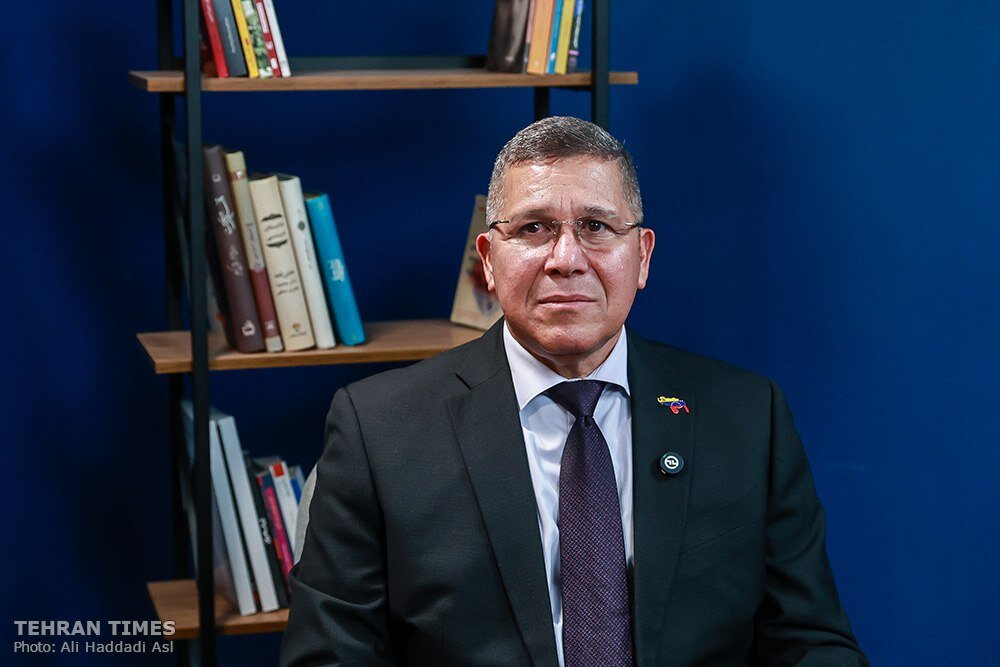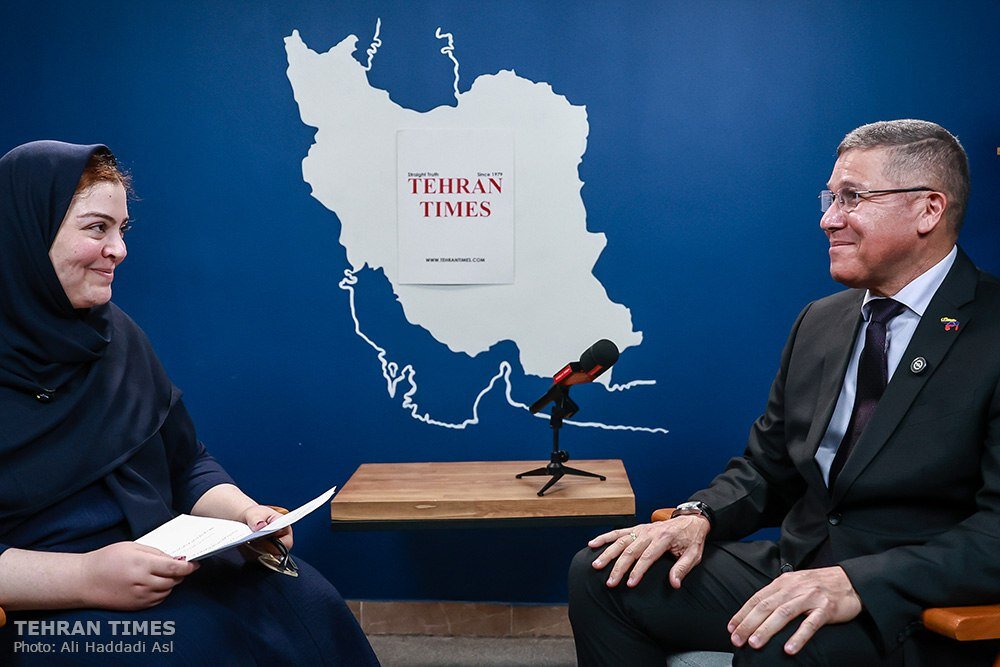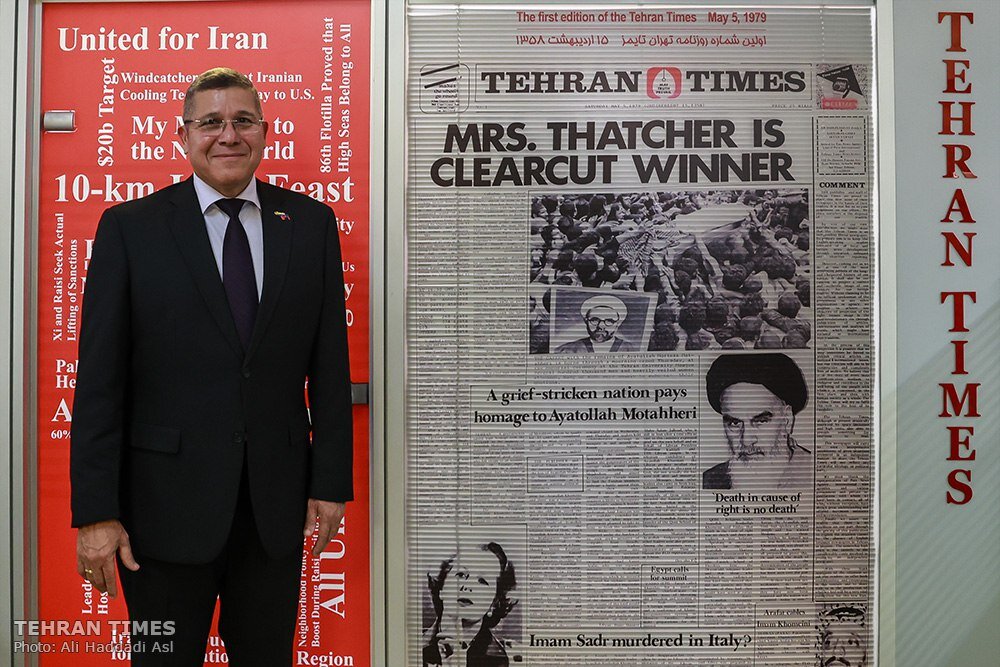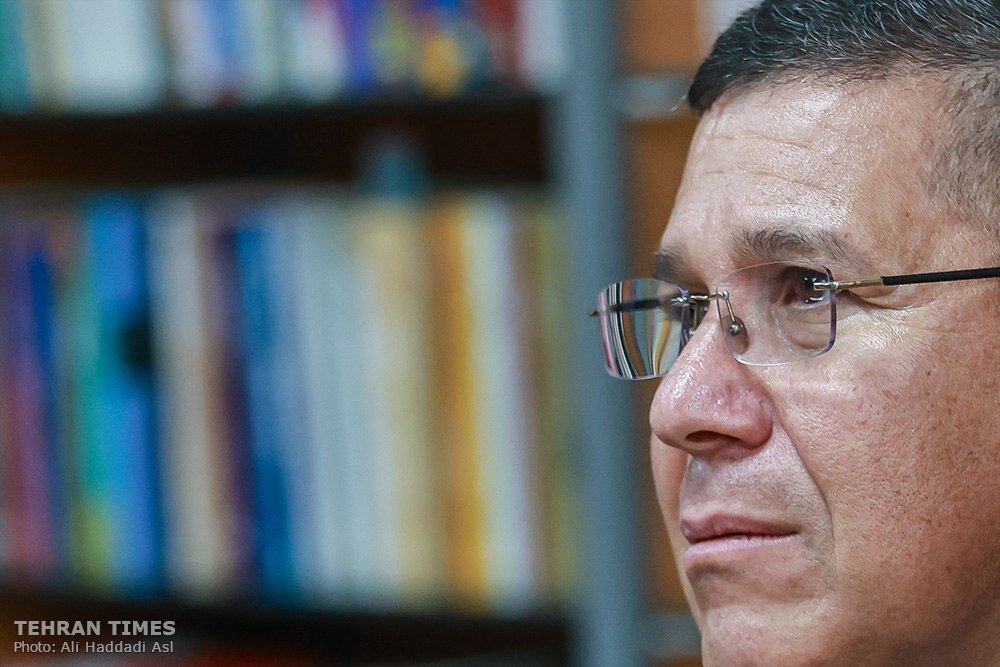8 million Venezuelans enrolled to defend homeland
If 87 percent of drug trafficking occurs via the Pacific, why did the U.S. deploy forces in the Caribbean?

TEHRAN – The Tehran Times exclusive interview with Venezuela’s ambassador to Iran, José Rafael Silva Aponte, comes at a fraught moment for Caracas and the wider region.
Tehran and Caracas have steadily deepened a strategic partnership since Hugo Chávez’s presidency, most visibly in the 20-year cooperation roadmap signed during President Nicolás Maduro’s 2022 visit to Tehran — a pact that framed cooperation across energy, health, science and technology, transport and education.
Over the past three years, the two countries have exchanged delegations, held successive sessions of the Iran–Venezuela Joint Commission, and concluded dozens of sectoral agreements that, according to the interview, now number 299, underscoring an unusually dense bilateral agenda.
At the same time, the security environment has sharply deteriorated. Washington’s expanded military presence in the Caribbean and eastern Pacific — including a recent carrier strike group deployment and other high-end assets — has heightened regional tensions and prompted Caracas to mobilize large-scale defensive measures. Caracas also points to United Nations drug-trafficking data showing that the bulk of narcotics originating in Colombia transit via Pacific routes, a statistic the Venezuelan government cites to dispute U.S. claims that Venezuela is a major transit hub.
This interview therefore, explores three intertwined themes — the institutional consolidation of Iran–Venezuela ties, Caracas’s account of external coercion and maritime incidents, and the domestic mobilization measures undertaken in response. The ambassador’s perspectives illuminate how bilateral diplomacy and regional geopolitics are shaping a high-stakes contest over sovereignty, security and economic resilience.
Below is the full text of the interview:
How would you describe the current state of political, economic, and diplomatic cooperation between Iran and Venezuela, and what milestones have defined this partnership over the years?
The ties between Iran and Venezuela began strengthening when President Hugo Chávez took office in 1999, and they have continued to grow ever since. After his passing, President Nicolás Maduro further consolidated these relations. In June 2022, during his visit to the region, President Maduro traveled to Iran and met with President Ebrahim Raisi. They signed a 20-year strategic cooperation agreement covering energy, healthcare, science and technology, transportation, education, and other sectors, further solidifying the partnership between our two nations. Politically and diplomatically, our relations remain strong and ongoing.

Since Dr. Masoud Pezeshkian became President of Iran, there have been two high-level meetings between the presidents. Additionally, Iranian Foreign Minister Abbas Araghchi and Venezuelan Foreign Minister Yván Gil have met more than five times at international forums and diplomatic gatherings.
Since 2022, numerous delegations have traveled between our countries. A Venezuelan delegation attended the 9th session of the Iran–Venezuela Joint Commission in Iran, signing memoranda of understanding. In 2024, the 10th session was held in Venezuela, with the Iranian side chaired by then-Defense Minister General Aziz Nasirzadeh, during which additional agreements were signed.
To date, 299 agreements have been concluded, and these relations continue to deepen. While imperialist forces have attempted to undermine the unity between our governments and peoples, the friendship and solidarity between our nations remain resilient.
How does Venezuela assess the current level of U.S. military threats and covert operations, and what measures has your government taken to address and counter these challenges?
As is widely recognized at the international level, The United States of America initiated threats against Venezuela, beginning with a false narrative. They fabricated a scenario linking President Maduro to a so-called terrorist group called Tren de Aragua. I should clarify that this group was dismantled years ago by our armed forces and was a criminal organization. Additionally, they falsely accused Venezuelan officials at the highest levels of government of connections to drug cartels. These allegations are entirely untrue. Based on these fabrications, they attempted to justify a military deployment. However, according to maps and data published by the United Nations Office on Drugs and Crime, Venezuela is neither a producer, processor, nor transit country for illicit drugs.
I want to reiterate that these maps and statistics were published by the United Nations Office on Drugs and Crime. They show that 87 percent of the narcotics produced in Colombia are trafficked to the United States via the Pacific Ocean. Only 8 percent pass through northern Colombia, and a mere 5 percent is linked to attempts by criminal groups to route drugs through Venezuela to Europe. The Venezuelan government has taken decisive measures to dismantle many of these criminal groups, often without violence.

This record of dismantling drug-related groups paints a very different picture from the military deployment initiated by the United States in September. I must emphasize that if 87 percent of drug trafficking occurs via the Pacific, why did the U.S. position its forces in the Caribbean? They deployed eight warships, a nuclear submarine, various fighter jets such as F-35s, and the aircraft carrier Gerald R. Ford, along with 1,200 missiles and 10,000 marines, all allegedly to control drug trafficking. These actions constitute U.S. provocations, as their armed forces have even violated Venezuelan airspace, and the threats remain ongoing.
Furthermore, the deployment of a nuclear submarine violates the Treaty of Tlatelolco, which established Latin America and the Caribbean as a nuclear-weapon-free zone. They have also breached another agreement ratified in 2014, which reaffirmed that Latin America and the Caribbean should remain peaceful and secure.
How do the Venezuelan people perceive the ongoing threats from the United States, and what steps has the Bolivarian government taken to defend national sovereignty and ensure the security of its citizens?
Regarding the measures and responses of the Bolivarian government to neutralize these U.S. actions, at the beginning of President Nicolás Maduro’s term, a call was made for public enrollment and mobilization. Approximately eight million citizens registered. The Bolivarian National Armed Forces consist of five branches: the army, navy, air force, and the Bolivarian militias, which initially numbered four million. With additional volunteers, this number reached eight million.
In the first two weeks, citizens responded positively to the President’s call, registering to defend their homeland. After two weeks, they were sent to military barracks for basic training, and all 3.5 million militia members were incorporated and trained by the armed forces. Under the direct orders of President Maduro, who is the Commander-in-Chief of the Bolivarian Armed Forces, these forces launched an operation called “Operation Independence 200.” The aim of this operation is to counter imperialist actions targeting the peace and security of the Venezuelan people.
As of today, at 4 a.m., a military exercise is ongoing in northern Venezuela, covering states including Zulia, Falcón, Carabobo, Aragua, Miranda, and Sucre. This defensive maneuver is designed to protect the Venezuelan coast, given that the United States has deployed forces in Puerto Rico and Trinidad and Tobago, creating ongoing threats.
The U.S. has also attacked Venezuelan and Colombian vessels across the region under the pretext of combating drug trafficking, resulting in the deaths of innocent civilians, including fishermen. On one occasion, eighteen vessels were targeted, leaving seventy dead in the eastern Pacific. These actions are unlawful, as even the U.S. Secretary of War has acknowledged that the legality of these operations is unclear, and it was unknown whether the targeted vessels were engaged in illicit activities. Fortunately, some individuals survived, including Colombian, Ecuadorian, and Mexican citizens who were detained by U.S. forces and later returned to their countries, bearing witness to the reality of these attacks.

These exercises, directed by our Defense Minister General Vladimir Padrino López under President Maduro, are defensive operations aimed at neutralizing increasingly frequent threats. They underscore Venezuela’s commitment to protecting its sovereignty, people, and territorial integrity against escalating external provocations.
How does the Venezuelan government respond to the recurring threats, accusations, and coercive actions from the United States?
As you are well aware, it is widely recognized that the United States does not consistently respect international law, human rights, or other global norms, and frequently promotes false narratives. I can cite several clear examples where the U.S. sought to overthrow or change governments that did not submit to its will: in Syria, with false accusations of chemical weapons; in Libya and Iraq, with allegations of weapons of mass destruction; and in Iran, during the 12-Day War on June 13, when they falsely claimed Iran’s nuclear program was intended for military purposes.
Now, they have also fabricated narratives regarding drug trafficking in Venezuela, which are completely false and have never been proven. The real purpose behind these accusations is to seize the wealth of countries exercising their sovereign rights freely and to intimidate them into submission.
In response, Venezuela has formally raised these issues in various international forums. For example, at the recent CELAC meeting in Santa Marta, Latin American and Caribbean countries discussed these concerns and issued a final statement emphasizing the importance of respecting national sovereignty, rejecting threats, and opposing sanctions.
Furthermore, the United Nations Human Rights Office, through spokesperson Volker Türk, has filed complaints regarding human rights violations affecting Venezuelan citizens in the Caribbean Sea and the Pacific Ocean. These voices have been raised globally, but as we know, the United States often acts as though international law, the UN Charter, and human rights norms do not apply to it.
Despite this, many friendly governments—including the Islamic Republic of Iran, represented by Foreign Minister Abbas Araghchi and Foreign Ministry Spokesperson Esmail Baghaei —have spoken out and amplified Venezuela’s position. Even within the United States, civil society and anti-war groups have voiced opposition to the U.S. threats and interventions, particularly across Latin America.
Historically, as they themselves have acknowledged, the United States has repeatedly attempted to destabilize independent governments in various countries. Regarding Venezuela, the U.S. has consistently sought to weaken the legal government through fomenting internal unrest and orchestrating coups, and this policy continues to this day.
In recent years, the United States has tried to undermine the legitimate government of Venezuela by creating internal chaos and even attempting a coup. It seems this strategy is still in play. Could you elaborate on the historical and current aspects of this situation?
I should say that the Bolivarian Revolution began with Commander Chávez’s rise to power in 1999. Before that date, we had no major problems with the United States, because the previous government had been aligned with U.S. policy. But on 2 February 1999, Chávez assumed the presidency, and from that moment imperialism began a campaign of attacks aimed at toppling our revolution.
On 11 April 2002, there was an attempted coup — a media-led putsch backed by treacherous elements within the military — motivated, above all, by oil, since petroleum is our country’s principal resource and main source of revenue. That coup lasted only 47 hours and ultimately failed because of the unity of the Venezuelan people and the loyalty of our armed forces: Chávez was freed and returned to the people’s palace. They thought he would be removed; they were wrong.
Chávez was re-elected with a broad majority, and on 5 March 2013, Nicolás Maduro assumed the presidency following a popular referendum and direct vote. The imperialist onslaught continued because they believed that if Chávez left, the Bolivarian Revolution would collapse. We have repeatedly faced political destabilization: President Barack Obama, for example, characterized Venezuela as an “unusual and extraordinary threat” to U.S. security — rhetoric that fed successive waves of pressure and intervention.

Throughout 2015 and beyond we saw engineered unrest and violence instigated by extreme right-wing opposition groups: arson, killings of innocent people, and attempts to overthrow the Bolivarian government. In 201,8 there was an attempted attack using drones on the anniversary of the Bolivarian National Guard; that plot was also foiled. The goal of these operations has always been the same: regime change so that our country’s wealth — its vast oil reserves, large gas and mineral resources, and unique geostrategic position at the northern gateway to South America — can be seized.
But we stand firmer than ever. President Maduro and every Venezuelan—from fishermen to workers—are united in defending our independence, sovereignty and dignity. Above all, we defend peace: President Maduro repeatedly emphasizes peace in all his speeches and insists that Venezuela must guarantee and preserve it.
How is Venezuela working with allies as well as international bodies to prevent US aggression and escalation?
We observed that in the United Nations Security Council’s recent session, Venezuela was given the floor to speak. Of the 15 Security Council members, 14 voted against the U.S. measures and spoke out — only the United States voted in favor of the U.S. position. We also enjoy the diplomatic support of friendly states such as the Islamic Republic of Iran, Russia, China, Belarus and others, which have publicly voiced their backing for Venezuela.
Voices across the region have been raised because damage to Venezuela would harm all of Latin America. Former Brazilian President Lula da Silva, despite not having the closest bilateral ties with us, publicly warned against such actions and urged guarantees for regional peace — for that, we thank him. Colombian President Gustavo Petro has also been wounded by U.S. pressure: he has been subject to slanders alleging cartel links, and many international communities have shown solidarity with him in rejecting such accusations.
Civil society around the world — including anti-war groups inside the United States — have rejected the U.S. threats and interventions. If these aggressions continue, the Bolivarian government led by Nicolás Maduro will respond without fear: calmly, bravely and with maximum unity to confront threats. We emphasize the coordinated role of military, police and popular operations to safeguard peace, independence and sovereignty. We are focused, mobilized and united with the support of our people to guarantee peace and protect the valuable gains we defend.
How does the government view the international attention given to figures like María Corina Machado, who openly ask that Venezuela be attacked?
The awarding of the Nobel Peace Prize to this particular individual has, in our view, degraded the prestige of the prize. The decision provoked a large and critical reaction; many people opposed it. It appears the Nobel Committee’s policies have changed. Frankly, one could say that the prize has become the ‘Nobel for War’ in practice. In the past, similar prizes were given to figures such as Henry Kissinger and later Barack Obama; now this prize has been given to a person who, in our view, has called for aggression, bombardment and intervention against her own country.
For Bolivarian Venezuela, this award has no meaning. We regard it as overtly political — awarded to those who call for an attack on their own homeland. We therefore do not attach any legitimacy to it. This woman and her supporters have no domestic standing in Venezuela; the foreign media noise they generate — now often in English — does not reflect popular support here. Someone who advocates attack and bombardment against their own country cannot be considered truly Venezuelan.
By Sahar Dadjoo
Leave a Comment